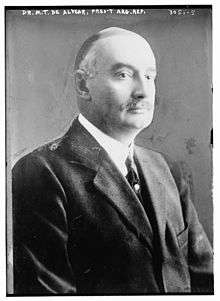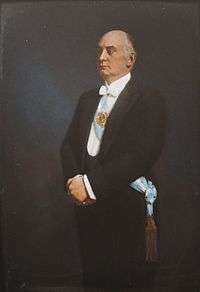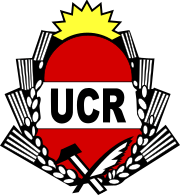Marcelo Torcuato de Alvear
Máximo Marcelo Torcuato de Alvear Pacheco (October 4, 1868 – March 23, 1942), better known as Marcelo T. de Alvear was an Argentine politician and lawyer who was President of Argentina from 1922 to 1928.[1]
Marcelo T. de Alvear | |
|---|---|
 | |
| President of Argentina | |
| In office October 12, 1922 – October 11, 1928 | |
| Vice President | Elpidio González |
| Preceded by | Hipólito Yrigoyen |
| Succeeded by | Hipólito Yrigoyen |
| Personal details | |
| Born | October 4, 1868 Buenos Aires |
| Died | April 23, 1942 (aged 73) Don Torcuato, Buenos Aires |
| Nationality | Argentine |
| Political party | Radical Civic Union |
| Spouse(s) | Regina Pacini |
| Relations | Torcuato de Alvear Elvira Pacheco |
| Profession | Lawyer |
Biography

Alvear was the son of Torcuato de Alvear, first Mayor of Buenos Aires.[2] As a young man he was a successful sports shooter, winning an individual bronze and a team gold in the free pistol event in the 1903 World Championship held in Buenos Aires. He would receive a team silver in the 1904 edition in Lyon, France. He was the founder of Argentina's National Olympic Committee.
Politics
As a politician he became the leader of the anti-personalistic faction of the centrist part of the Radical Civic Union (UCR) co-founded by Yrigoyen, opposed to some of president Hipólito Yrigoyen's policies. In contrast to Yrigoyen's popular style, Alvear belonged to the self-appointed "aristocracy" of Buenos Aires and never tried to hide it. He married opera singer Regina Pacini. In 1917, he was appointed Ambassador to France.[3]
Presidency
In 1922, Argentina's president Hipólito Yrigoyen designated Alvear to be his successor. During his term, the economy of Argentina reached a peak performance, which would come to an abrupt halt due to the Great Depression shortly after his mandate ended.[4]
After of the his presidency
After the coup against Yrigoyen on September 6, 1930, Alvear gained control of the party and led the unsuccessful opposition to the conservative governments that followed, including the failed revolution of 1932. As a result, he was arrested and deported to Europe.
Securing an agreement to the effect from President Agustín Justo in 1935, Alvear returned to Argentina, whereby he became the UCR's nominee for the presidency.
Encouraged by favorable results during mid-term elections in 1936, the UCR ran a vigorous campaign ahead of the 1937 presidential election. Breaking his word to Alvear, President Justo orchestrated what his own party's Governor of the Province of Buenos Aires labeled "one of the most fraudulent elections in history."[5]
He died on March 23, 1942.
See also
- History of Argentina (The Radicals in Power, 1916-1930)
References
- «Marcelo T. de Alvear» (en español). Portal Planeta Sedna. Consultado el 4 de mayo de 2010.
- Torcuato de Alvear, primer intendente municipal de la ciudad de Buenos Aires:, Adrián Beccar Varela
- 1889-1939:, Alberto Dodero, Philippe Cros
- La crisis de 1930, Marcelo Torcuato de Alvear
- Marcelo T. de Alvear, Planeta, 2001
External links
- Britannica.com
- Newspaper clippings about Marcelo Torcuato de Alvear in the 20th Century Press Archives of the ZBW
| Political offices | ||
|---|---|---|
| Preceded by Hipólito Yrigoyen |
President of Argentina 1922–1928 |
Succeeded by Hipólito Yrigoyen |
